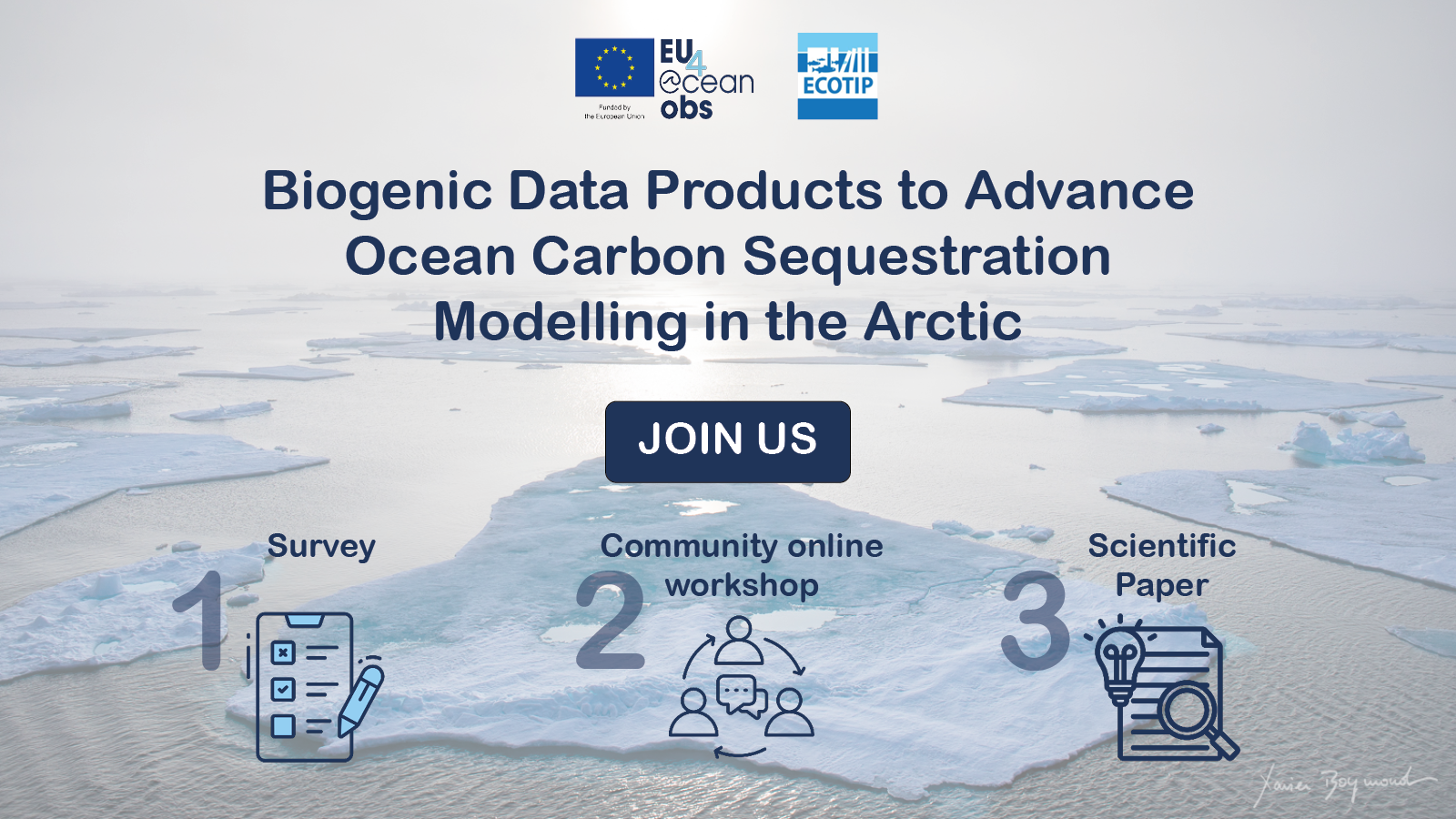
We invite experts in observing or/and modelling approaches and Arctic ecosystems to join an action organised by the EU-funded projects ECOTIP and EU4OceanObs towards advancing modelling carbon sequestration in the Arctic.
The action has 3 phases and the final goal of publishing a community-perspective article identifying biogenic data products to advance ocean carbon sequestration modelling in the Arctic. Experts are invited to join us in steps 1 and 2 to be involved in the manuscript preparation.
PHASE 1:
ONLINE
SURVEY

Community perspectives on identifying important processes for advancing modelling carbon sequestration in the Arctic. Phase 1 is open to everyone who would like to contribute to this effort as a co-author or not. Click button below to fill in the survey.
Deadline: 4 October 2023
PHASE 2:
ONLINE
WORKSHOP

Online workshop from 18 to 19 October 2023 to identify biogenic products related to the priorities from the survey, their observing status, and model readiness.
PHASE 3:
SCIENTIFIC
PUBLICATION

Engaged participants from phases 1 & 2 will work as co-authors for the submission of a perspective article on biogenic data products for advancing ocean carbon in the Arctic.
Target Audience
We invite experts with a sound understanding of Arctic ecosystems and observing and/or modelling approaches. To participate, please fill in the survey and at the end indicated if you wish to take part in the online workshop.
Contact
Context
The ocean generates 50% of the oxygen the planet needs, absorbs 25% of all carbon dioxide emissions and captures 90% of the excess heat generated by these emissions. It is not just ‘the lungs of the planet’ but also its largest ‘carbon sink’ – a vital buffer against the impacts of climate change (UN source). The ocean is central to reducing global greenhouse gas emissions and stabilizing the Earth’s climate. However, increasing greenhouse gas emissions have affected the health of the ocean – warming and acidifying seawater – causing detrimental changes to life under water and on land, and reducing the ocean’s ability to absorb carbon dioxide and safeguard life on the planet.
According to current estimates, the Arctic Ocean accounts for 5 % to 14 % of the total global oceanic carbon uptake (Bates and Mathis, 2009; Schuster et al., 2013; MacGilchrist et al., 2014; Yasunaka et al., 2016, 2018). Longer open-water seasons are expected to increase Arctic oceanic carbon uptake in the near term, with complex feedbacks altered by climate change (Lannuzel et al., 2020; Steiner et al., 2015; Ouyang et al., 2020), but the scarcity of biogeochemical observations in the Arctic Ocean prevents reliable calculations of carbon flux (e.g., Landschützer et al., 2014), as well as proper validation of climate models in the region.(Adapted from research article by Richaud B et al (2023): Underestimation of oceanic carbon uptake in the Arctic Ocean: ice melt as predictor of the sea ice carbon pump (copernicus.org))
The two EU-funded projects EU4OceanObs and ECOTIP are collaborating to improve biogenic data products to advance ocean carbon sequestration modelling in the Arctic for better understanding and prediction of the Arctic Ocean’s oceanic carbon uptake in a changing climate, which in turn will allow us to predict ecosystem impacts and support action to protect this vulnerable ecosystem. This topic is a cross-cutting activity in the EU4OceanObs G7 FSOI component, which works to augment the capacity of marine life monitoring and forecasting, improve monitoring and understanding and prediction of global ocean carbon cycle and enhance Arctic Ocean observing and monitoring. ECOTIP – Ecological tipping cascades in the Arctic Seas is a flagship Horizon 2020 research project focusing on understanding and predicting changes in Arctic marine biodiversity and implications for two vitally important marine ecosystem services: fisheries production, which is the economic lifeblood of many Arctic communities, and carbon sequestration, which has important feedbacks to the global climate.
Useful links
- Ecological tipping cascades in the Arctic Seas (H2020 ECOTIP project): ecotip-arctic.eu
- EU4OceanObs summary of EU initiatives to enhance Arctic Ocean Observation and its use for societal benefit: www.eu4oceanobs.eu/regional_initiatives/arctic/
- G7 FSOI focus on Arctic Ocean Observation capability: https://www.g7fsoi.org/activities/emerging-issues-new-frontiers-topics/




